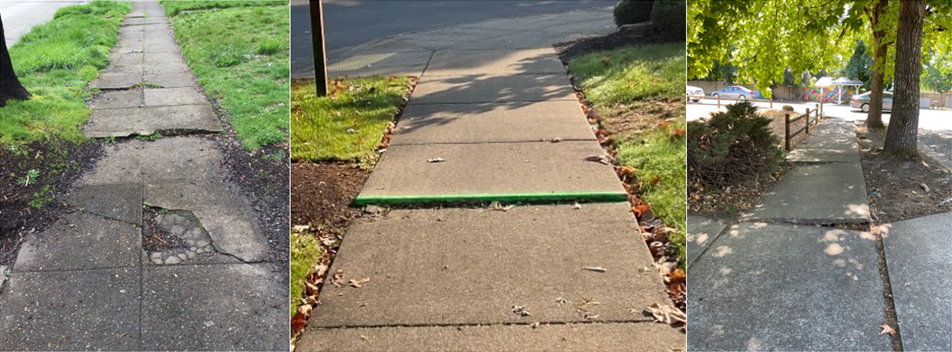‘Time for Eugene to treat sidewalks as essential public infrastructure’
It’s time for Eugene to treat sidewalks as essential public infrastructure. Contact city councilors before June 25 and ask them to support a long-term, equitable sidewalk repair strategy.

UPDATED 7/23/25: Changed name of CURBS.
Originally published in Lookout Eugene-Springfield.
If you’ve walked on Eugene’s sidewalks, chances are you’ve stumbled or even fallen on cracked, uneven pavement. Maybe you cursed the hazard. Maybe you wondered, “Why doesn’t somebody fix this?” The answer might surprise you: In Eugene, fixing the sidewalk isn’t the city’s job. It’s yours.
While the city of Eugene maintains streets, bike lanes, off-street paths and has even added accessible curb ramps at intersections, sidewalks are left out of the equation. That’s because under city code, adjacent property owners—not the city—are responsible for maintaining sidewalks. The trouble is, most property owners don’t even know that. And so, while our roads improve, our sidewalks continue to deteriorate.
The current sidewalk repair system is reactive, inefficient and inequitable. It starts when someone files a complaint. City staff inspect the sidewalk and, if it’s found to be hazardous, notify the property owner to fix it. If owners can afford to hire a contractor, which may cost $1,000 to $2,000 per sidewalk panel, they might make the repair. If they can’t, the city checks if they qualify for limited financial assistance.
Often, the owner ignores the notice and with limited budget and staff, the city typically can’t follow up. The result? Sidewalk hazards persist and the system breaks down.
City staffers are aware of the issue. Thanks to growing community concern, they’re working on ideas to improve sidewalk conditions. They’ll report to the City Council during a June 25 work session, where councilors will have a chance to weigh in and give direction.
Citizens Community United to Repair Broken Sidewalks, a community advocacy group, is urging the city to use this opportunity to develop a long-term strategy; one that fixes sidewalk conditions across Eugene over the next decade.
Sidewalk repair is a complex challenge. Besides funding, there are deep questions of fairness. Some neighborhoods are far worse off than others. For some property owners, sidewalk repairs are manageable; for others, the cost is simply out of reach.
One homeowner might be required to fix a section, while equally hazardous sidewalks on the same block go untouched. Even filing a complaint can be a barrier. Navigating the city’s online form requires time, internet access and digital know-how.
But the fact that it’s complicated isn’t an excuse for doing nothing. Sidewalks are public infrastructure. Everyone uses them, whether walking the dog, pushing a stroller, using a wheelchair or walker or getting around with a cane. Children walking to school, older adults heading to the store or anyone moving from point A to B deserve to do so safely.
It’s time for Eugene to treat sidewalks as essential public infrastructure. Just as we need safe streets and accessible transit, we need sidewalks that serve all of us regardless of age, income, or ability. The current system is broken; it’s slow, unfair and ultimately unsafe.
City Council has a chance to chart a better course. CURBS urges Council to act boldly by committing to a sidewalk repair strategy that spreads responsibility fairly, provides meaningful support to those who need it, and ensures sidewalks are safe and accessible for everyone.
Our sidewalks should not be obstacles. They should be pathways to community, to independence, to a city that works for all its people.
Next step: Contact city councilors before their work session on June 25 and ask them to support a long-term, equitable sidewalk repair strategy.
Sue Wolling is a retired ICU nurse and long-time active transportation advocate who usually travels by bike, which she finds can be safer than walking.
Larry Craig is a retired 911 systems coordinator and active “wheeler” in the outdoors who handcycles and rolls the sidewalks of our community in his manual wheelchair.
Both are members of Citizens Community United to Repair Broken Sidewalks (CURBS), a.k.a. Cycle of Change Walking, a project of BEST. Learn more.